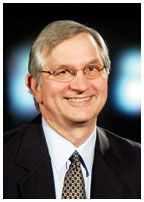|
Web Exclusives: Alumni Spotlight July 19, 2006:
Transforming public broadcasting Little did James Pagliarini ’75 know, as a junior studying biology at Princeton, that a paper on Fred Rogers for a psychology class would radically change his career path. Researching that paper led Pagliarini into a career in public television, where he’s now heading a national task force aimed at transforming the future of public broadcasting. In a media world with a growing number of opportunities to transmit and receive content, Pagliarini, the president of Twin Cities Public Television (TPT), is finding new ways to do business while preserving the role and meaning of public television, so clear in Mr. Rogers’ work. “We envision people being able to access the best of public television, anytime, anywhere, anyplace,” Pagliarini says. “From downloading segments from Sesame Street to multicasting programs directly to people’s computers, the viewer wants more choices.” Already, children’s programming is offered on demand through many cable systems. Science shows for kids are available through podcasts; shows can be downloaded for free through programs such as Google Video. To ensure the future of public television, Pagliarini has started an innovative project; forming partnerships with nonprofits to produce educational programming, often for niche markets. Stations around the United States are pursuing other types of affiliations, with universities or state governments. Flip on the Minnesota Channel, one of TPT’s digital stations that features exclusively local and regional programming, and you might see a documentary like The Changing Face of Hunger, co-produced by TPT and Second Harvest Heartland, a food bank in St. Paul. Pagliarini likes to joke that he found his own niche when he decided
to abandon plans to become a doctor after injuring a hamster in
a biology lab. At 27, he helped create a public television station
in Reno, Nev. While Pagliarini is changing the way public television
runs, its award-winning national content will remain. “I hope
there will always be a show like Mr. Rogers,” he says. By Sheila Mulrooney Eldred Sheila Mulrooney Eldred is a freelance writer in Minneapolis, Minn.
|
||

